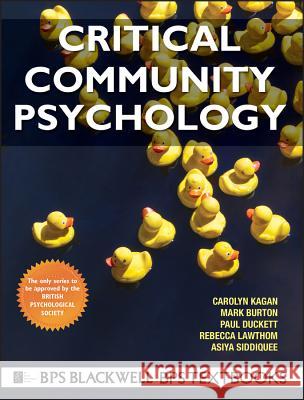Critical Community Psychology » książka
Critical Community Psychology
ISBN-13: 9781405188845 / Angielski / Miękka / 2011 / 400 str.
Interest in community psychology, and its potential has grown in parallel with changes in welfare and governmental priorities. Critical Community Psychology provide students of different community based professions, working in a range of applied settings, at both undergraduate and postgraduate levels, with a text which will underpin their community psychological work. Key Features:
- Clear learning objectives and chapter contents outlined at the start of each chapter
- Key terms highlighted with definitions, either as marginal notes or in chapter glossaries
- Case examples of community psychology in action
- Each chapter ends with a critical assessment section
- Discussion points and ideas for exercises that can be undertaken by the reader, in order to extend critical understanding
- Lists of further resources -- e.g. reading, film, electronic
- Authors are members of the largest community psychology departmental team in Europe
Community Psychology is developing in the UK after a much longer history elsewhere in Europe, North and Latin America and Australasia, although principles and methods of community psychology have been used in UK social work, community and youth work, community development and community education.Interest in community psychology, and its potential as a distinct approach in the UK has grown in parallel with changes in welfare and governmental priorities. The contemporary emphasis on the importance of community; understanding social exclusion, and working towards social inclusion; stakeholder interests in social change and ′bottom up′ or participatory ways of working; the development of social capital and community participation; urban regeneration, and citizenship, for example, all coincide with the particular emphases within community psychology of understanding marginalised human behaviour and experience within different social contexts and of working in partnership with those affected by both psychological work and social changes. Furthermore, the growth of social change projects, and the evaluation of these projects in conjunction with those affected by them, has revealed a gap in contemporary, practical texts underpinning such work. Thus it is timely to develop the available literature in Community Psychology.This book aims to provide students of different community based professions, working in a range of applied settings, at both undergraduate and postgraduate levels, with a text which will underpin their community psychological work. Specifically the book aims:1. To provide an action learning framework in which the theories, values and principles of community psychology can be understood critically, along with the practical skills of working as a community psychologist
2. To illustrate different ways of working participatively with local people on agendas of change which are liberatory
3. To outline the process of conducting community psychological practice, from problem identification, through to evaluation stages, reflecting an action research process
4. To provide practical guidance on the practice of community psychology across different kinds of problems, at different levels, and ina range of different applied settings
5. To integrate evidence for effective practice with practical expediency in order to achieve change
6. To provide different kinds of examples of community psychological practice in different applied settings
As the book is about critical praxis, it will contain a number of features to help the reader develop critical engagement with the material. These include:
- Clear learning objectives and chapter contents outlined at the start of each chapter, highlighting the theoretical content, research issues and practice dilemmas to be covered
- Key terms highlighted with definitions, either as marginal notes or in chapter glossaries
- Use of figures and tables, including photographs as relevant, to render complex issues more accessible
- Case examples of community psychology in action. Each boxed example will illustrate key points in the text and will include critical questions to encourage reflection and reflexivity on the part of the reader
- Each chapter will end with a critical assessment section where the dilemmas and paradoxes raised by the substance of the text and the case examples will be questioned
- At the end of each chapter will be some discussion points and ideas for exercises that can be undertaken by the reader, in order to extend critical understanding
- Each chapter will list further resources – e.g. reading, film, electronic











